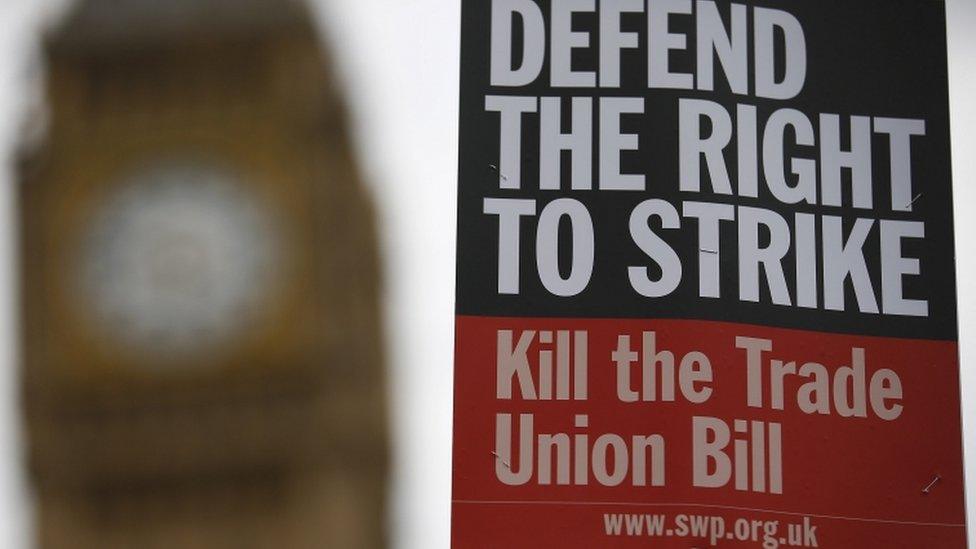SNP conference 2015: Minister wants Scotland excluded from union bill
- Published

The UK government wants to impose a minimum 50% turnout in strike ballots
The Scottish government has made an official request for Scotland to be excluded from the UK government's bill proposing curbs on trade union powers.
SNP minister Roseanna Cunningham told her party's conference that the plans would undermine industrial relations.
Her plea followed condemnation of the bill by Grahame Smith, the General Secretary of the Scottish TUC.
Mr Smith was the first leader of the Scottish Trade Unions Congress (STUC) to address an SNP conference.
The UK government wants to impose a minimum 50% turnout in strike ballots - with public sector strikes also requiring the backing of at least 40% of those eligible to vote.
Under current rules, strikes can be called if the majority of those taking part in a ballot vote in favour.
The Trade Union Bill, external, which would apply to unions in England, Wales and Scotland, will also:
Double the amount of notice unions have to give before a strike can be held - from seven to 14 days
Allow employers to use agency workers to replace striking staff
Introduce fines of up to £20,000 on unions for repeatedly failing to ensure picket supervisors wear an official armband
End the so-called check-off system for collecting union subs direct from a salary
Ms Cunningham told the delegates gathered in Aberdeen: "It is our view that all the measures within the bill in combination will affect employees' right to strike, change the relationship between unions and organisations negatively, and lead to greater confusion amongst employees.
"This directly impacts across Scottish business and especially our devolved public services in Scotland. I believe this is not a constructive platform upon which we can pursue our ambitions for Scottish workers."
She added that she had considered the proposals "very carefully" and believed the only solution was to "ask that Scotland is excluded from the entire bill".

ANALYSIS
By Philip Sim, BBC Scotland political reporter

There were rumblings about the trade union bill at the SNP conference even before Roseanna Cunningham spoke out this morning.
At a Scottish Police Federation fringe event, Michael Matheson MSP batted away questions about whether he would block the bill in Scotland if he could.
The justice secretary said it would be a matter for the SNP to decide on as a party, but with a resolution on the agenda which described the bill as an "ideological attack", the position was fairly clear from the outset.
This was underlined when Scottish Trades Union Congress secretary Grahame Smith was given a rapturous reception by delegates as he took to the stage to slam the bill.
As well as striking popular chords by railing against the Conservatives in Westminster, he used his speech to urge the huge crowd of activists to join up with trade unions.
This will be worrying for Labour, traditionally the party of the unions, which will need their support as it looks for a way to overcome the SNP's continuing dominance and win back Scottish voters at next May's Holyrood election.

Earlier, from the conference stage, Mr Smith said the bill raised "serious questions about the nature of democracy in the UK".
He added: "It [the bill] should be of concern not just to unions and their members, but to anyone concerned about democracy, human rights and civil liberties.
"The Tories claim that their proposals on ballot thresholds are about outlawing undemocratic strike action. This has nothing to do with democracy.
"I will not take lectures about democracy from a government elected on only 24% of those eligible to vote - and only 10% of those eligible to vote in Scotland - much less, of course, than the proposed thresholds that they wish to impose on strike ballots."
What else has been happening at the SNP conference?
- Published17 October 2015

- Published17 October 2015

- Published15 September 2015
